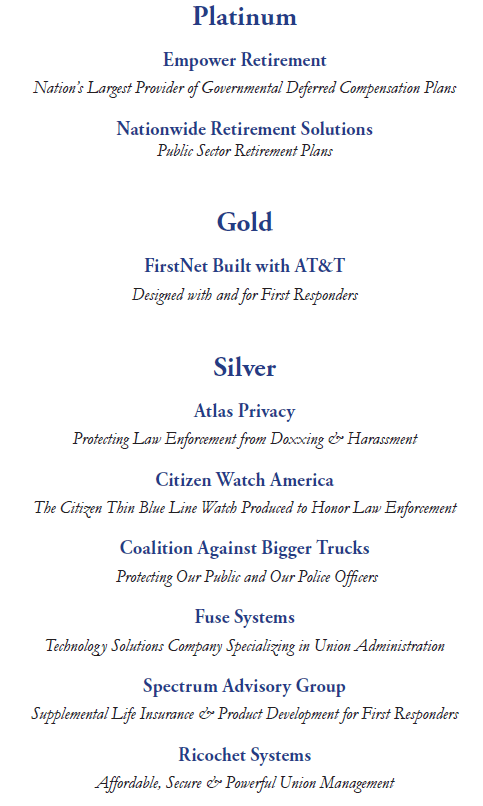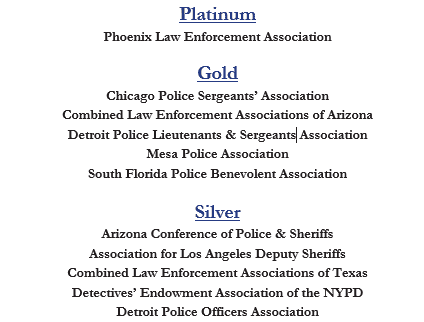NAPO Attends HALT Fentanyl Bill Signing
On July 16, NAPO attended the official bill signing ceremony for the Halt All Lethal Trafficking of (HALT) Fentanyl Act at the White House. Enactment of this legislation has been a top priority for NAPO as it gives law enforcement the tools and resources necessary to combat and deter fentanyl in our nation’s communities.
The HALT Fentanyl Act makes permanent the current classwide scheduling of all fentanyl-related substances as Schedule 1 drugs under the Controlled Substances Act (CSA). We have long fought for the permanent scheduling of fentanyl-related substances as Schedule 1 drugs, but until now Congress has only given us temporary renewals.
Fentanyl is the drug most associated with overdoses in the United States. It is being mixed with already deadly illicit drugs, hidden in counterfeit drugs, and being peddled at alarmingly high rates to our nation’s youth. 5 out of 10 counterfeit prescription drugs seized by law enforcement in 2024 were laced with a deadly dose of fentanyl. Fentanyl is now the drug most associated with overdoses in the United States. The amount of fentanyl the Drug Enforcement Administration (DEA) seized in 2024 – nearly 8,000 pounds of fentanyl – represents over 367 million deadly doses.
Law enforcement officers are out in our communities fighting the spread of fentanyl. They are responding to fentanyl overdoses and deaths, trying to save lives and take fentanyl off our streets. Fentanyl precursors and analogues will now be permanently scheduled as Schedule 1 drugs under the CSA. We were honored to witness the President sign this important, lifesaving bill into law.
President Signs One Big Beautiful Bill into Law
President Trump signed his priority legislation, the One Big Beautiful Bill (OBBB), on July 4, after it was narrowly passed by the Senate and then the House.
The OBBB includes provisions to strengthen funding to help state and local law enforcement protect communities from cross-border crime as well as several tax provisions that would impact NAPO members, including no tax on overtime pay (with a cap), an increase in the state and local tax (SALT) deduction cap, and an end to de minimis treatment for all low-value commercial shipments.
The legislation supports immigration and law enforcement efforts, including bolstering funding for Immigration and Customs Enforcement (ICE) 287(g) agreements for state and local law enforcement participation in federal immigration efforts. It also includes $3.33 billion in funds for Department of Justice immigration efforts, anti-drug task forces, and for the Bryne Justice Assistance Grant (JAG) and Community Oriented Policing Services (COPS) programs to help state and local agencies investigate and prosecute violent crime, support criminal enforcement initiatives, and assist in immigration enforcement.
Additionally, the OBBB creates a State Border Security Reinforcement Fund within the Department of Homeland Security (DHS) for grants to state and local governments to assist with efforts around building a border wall or barrier, the detection and interdiction of illicit substances and illegal aliens who have committed a federal, state, or local crime, and the transfer and referral of such aliens to DHS. The bill provides $10 billion through 2034 for this Fund.
Also included in the OBBB is an additional $500 million under the DHS State Homeland Security Grant Program to increase state and local capabilities to detect and track unmanned aircraft systems (UAS).
As for the tax provisions, the bill makes overtime pay an above-the-line deduction for eligible individuals, but it sets limitations on the amount of overtime that can be deducted. An individual cannot deduct more than $12,500 in overtime per tax year ($25,000 for a joint return) and reduces the allowable amount by $100 for every $1,000 by which an individual’s modified adjusted gross income exceeds $150,000 (or $300,000 for a joint filing). Overtime-earning taxpayers will enjoy this tax-free overtime provision until December 31, 2028, when it expires.
The OBBB increases the SALT deduction cap, upping it from the current $10,000 to $40,000 per tax year and places a cap on the ability of high-income individuals to deduct state and local taxes starting with taxpayers with income over $500,000. This rise in the SALT deduction cap sunsets in 2030, after which it will return to the $10,000 threshold.
These tax provisions go into effect for tax years starting in 2025.
In a significant victory for NAPO, the OBBB contains language to end de minimis treatment for all low-value commercial shipments effective July 1, 2027. Closing the de minimis loophole for commercial packages will help stop the flow of illicit narcotics coming across our borders and greatly assist law enforcement in the fight fentanyl.
If you have any questions regarding the OBBB or any of the provisions mentioned, please contact NAPO’s Director of Governmental Affairs, Andy Edmiston, at aedmiston@napo.org.
Federal Appeals Court Throws Out 9/11 Plea Deal
On July 11, the D.C. Circuit Court of Appeals, in a 2-1 ruling, tossed out a plea agreement that would have allowed 9/11 terror mastermind Khalid Sheikh Mohammed and two co-defendants to plead guilty and avoid the death penalty. This ruling upheld then-Defense Secretary Lloyd Austin’s decision to undo the plea deal approved by military lawyers and senior Pentagon staff.
In August of 2024, it was discovered that the federal authorities, in secret, had been working out plea deals with these terrorists for almost two years, without any meaningful input from victims and their families. NAPO objected then, and the Secretary of Defense withdrew the offer, and fired the Pentagon official who had extended it.
In November 2024, a trial judge of the Military Commission Trial determined the withdrawal of the plea deal offer by the Secretary of Defense was too little, too late. The trial judge issued an order saying that the official who made the offer had the authority to do so when she did it and that the Secretary of Defense’s reversal and firing of the official was too late to revoke the offer, which had already been accepted by three defendants.
President Mick McHale sent a letter to the Secretary of Defense, the President, the President-elect, the chief prosecutor, and the trial judge of the Military Commission Trial on November 7, 2024, in response to the judge’s decision to validate the terrorists’ plea deals, conveying our disgust.
In its ruling last week, the D.C. Circuit Court overturned the trial judge’s decision and found that then-Defense Secretary Austin unquestionably had the legal authority to withdraw from the plea agreements because the provisions of the deal had not yet been fulfilled, and the government had no adequate alternative remedies.
NAPO applauds this decision to revoke the plea agreement for these admitted 9/11 terrorists who should pay the ultimate price for their actions.
NAPO Priority Back the Blue Act Reintroduced
Congressmen Don Back (R-NE) and Jared Golden (D-ME) reintroduced NAPO priority legislation, the Back the Blue Act (H.R. 4310).
This legislation is critical, as law enforcement officer assaults, injuries, and deaths have increased sharply in recent years. According to a May 2024 report from the Office of Community Oriented Policing Services (COPS), 378 officers were shot in the line of duty in 2023, of which 46 officers died from their injuries. 138 of those officers were shot and 20 died in 115 separate ambushes or premeditated, calculated assaults. While the number of officers dying from their injuries may be decreasing, the number of officers being targeted for violence remains persistently high.
The Back the Blue Act would help stop this senseless violence against our nation’s law enforcement community. It would add new criminal provisions to address the assault, attempted murder or murder of federally-funded law enforcement officers. It would also create a new federal crime for interstate flight to avoid prosecution for such crimes. It would increase penalties on those who harm or target for harm public safety officers by making the murder or attempted murder of a local police officer, firefighter, or first responder an aggravating factor in death penalty determinations. The Back the Blue Act would help to bring federal resources to bear in the prosecution of those who attempt to harm or murder any public safety officer.
NAPO has long been fighting to establish stricter penalties for those who harm or target for harm law enforcement officers. Any persons contemplating harming an officer must know that they will face serious punishments. NAPO strongly believes that increased penalties make important differences in the attitudes of criminals toward public safety officers and ensure protection for the community.
FY 2026 Federal Appropriations Update
With the passage of the One Big Beautiful Bill on July 3, Congress has turned its focus on working through as much of the Fiscal 2026 appropriations process as possible before the August recess. On July 15, the House Appropriations Subcommittee on Commerce, Justice, Science and Related Agencies (CJS) approved its FY 2026 CJS appropriations measure.
The House CJS spending bill allocates $897.96 million for the Byrne Justice Assistance Grant (Byrne JAG) Program, with $501.3 million in carveouts for programs including $13 million for the VALOR Program, $20 million for the Project Safe Neighborhoods Grant Program, and $30 million for the Bulletproof Vest Partnership (BVP) Grant Program. It also appropriates $40 million for the Justice and Mental Health Collaboration Program (JMHCP), $82 million in total for the STOP School Violence Grant program and provides no funding for the BJA Body Worn Camera Grant Program.
For the Community Oriented Policing Services (COPS) Program, the House CJS bill appropriates $654.14 million, of which $256.2 million is allocated for the COPS Hiring Program with a carve out of $10 million for the Law Enforcement Mental Health and Wellness Act (LEMHWA) and the Supporting and Treating Officers in Crisis (STOIC) Act programs. It also provides $12 million for the POLICE Act program for officer active-shooter training, $16 million for the COPS anti-meth task force program and $35 million for the anti-heroin task force program. The measure makes no mention of the National Blue Alert Program, which is run by the COPS Office, or the Collaborative Reform Initiative.
These funding levels are on par with how these programs have been funded over the past several fiscal years, with no significant cuts to NAPO’s priority grant programs except for the Body Worn Camera Grant Program, which we are working to ensure is funded in the final CJS appropriations bill.
The House CJS spending measure makes no mention of merging the COPS Office into the Office of Justice Programs (OJP), which has been proposed by the Administration. Maintaining an independent COPS Office is a top priority for NAPO and while we appreciate that House appropriators make no mention of the proposed merger, we will work to include language prohibiting the integration of the COPS Office into OJP. The FY 26 CJS spending bill does include language prohibiting the use of any funds to merge the Bureau of Alcohol, Tobacco, Firearms, and Explosives (ATF) into the Drug Enforcement Agency, which is an objective of the Administration.
The next step is for the whole House Appropriations Committee to approve the bill before it goes to the House floor for a vote. There are only 2 weeks left until the August recess and the House has only approved one FY 26 appropriations bill, the Military-Construction spending measure, and that was largely along party lines.
The Senate Appropriations Committee approved its version of the FY 26 CJS appropriations bill on July 17 but the bill text was not available at the time of publication. It is hailed as a largely bipartisan bill, but the final vote became partisan after an announcement by the Administration that the White House will not abide by any bipartisan spending agreements made this year.
NAPO continues to monitor the CJS appropriations measures as they make their way through the House and Senate.
NAPO Backs Restoring the Armed Career Criminal Act
NAPO has once again pledged our support for the Restoring the Armed Career Criminal Act (H.R. 4334 / S. 2250), reintroduced by Congressman David Kustoff (R-TN) and Senator Marsha Blackburn (R-TN).
Congress passed the Armed Career Criminal Act (ACCA) in 1984 to protect our nation’s communities from the most dangerous violent criminals. Specifically, the ACCA established a 15-year mandatory minimum sentence for repeat violent felons convicted of unlawful possession of a firearm in violation of 18 U.S.C. § 922(g) who have been previously convicted of serious felonies on three separate occasions.
In 2015, the Supreme Court effectively voided the ACCA in its decision in Johnson v. United States due to part of the definition of “violent felony” being unconstitutionally vague. This ruling took away an important tool that law enforcement used to get the worst career criminals off our streets. The Restoring the Armed Career Criminal Act will fix the ACCA by using a specific definition for “serious felony” and restore the Act, thus giving prosecutors and law enforcement back a significant resource in the fight against violent crime.
Special Thanks to Our 2025 Convention
Exhibitors & Sponsors


Special Thanks to Our Law Enforcement Sponsors


